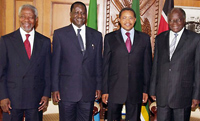Power Sharing: A Threat to Africa’s Democracy

 |
| Kenya's Power-Sharing Deal |
The power sharing trend is quite unfortunate. It renders the whole exercise of elections meaningless. In Kenya, Raila Odinga is the executive prime minister. In Zimbabwe, if the talks do not stall, Morgan Tsvangirai is destined to become the prime minister. Remember in both countries, the electoral process was extremely violent and cost the lives of innocent citizens.
What does power sharing help the ordinary Zimbabwean or Kenyan who wakes up early to vote for a socio-political and economic turnaround? If I may give an example of Uganda where majority of the peasants’ children cannot access jobs or quality education; where the people of northern Uganda for two decades have lived in sordid conditions partly because of the government’s indifference; where roads lead to miscarriages because of potholes; where university graduates work for less than $250 dollars a month if they are lucky to get a job and where jobs and scholarships are given on the basis of who knows who and who comes from where. I wonder whether power sharing is the ideal.
True, the contenders in the race may benefit because of the ministerial appointments, but how far will they influence governance? Politicians are policy makers but the policies are implemented by bureaucrats. How will Tsvangirai or Raila for instance influence the trend of job allocation? If there is any Ugandan politician who intends to share power come 2011 in case Museveni loses, please help us.
Voters don’t cast their votes because they love the aspirants. It is because they feel there is need for change in the status quo. If I have been jobless for the last ten years courtesy of poor governance, what will I benefit, if the candidate I vote embraces a power-sharing deal?
How come in the United Kingdom or the USA, there is no Labour- Conservative party and Republican-Democratic power-sharing? Yet, with the developed countries people largely get jobs on the basis of meritocracy as opposed to patronage. Assuming, all African countries followed suit, what will happen to the Ugandan workers who fall in the category of the working poor and believe in the political elites and employers to keep them in the wretched conditions? What about the street children who the government in power has no policy to help? What happens to the citizens who wallow in extreme poverty because of misallocation of state resources? What of the politicians and bureaucrats who embrace corruption as a way of life and the head of state supports them as long as they don’t threaten his stay in power?
 |
| Zimbabwe Power-sharing Deal |
Power sharing is first aid but not a remedy for the malady that characterizes African states. It is only a pointer that those who contest elections are also human and cannot resist greed. Those who share power start enjoying the state delicacies while their supporters remain in misery.
Until I am convinced that sharing power can lead to the total overhaul of defective state institutions and structures, I remain dismayed by the notion of power-sharing. In Uganda, politicians are dipping their hands in the workers’ till as the head of state looks on. What would happen to the culprits if Dr. Besigye or Hon. Mao shared power with the current clique of leaders? Will they change the status quo? No. On the contrary, they will be bound by collective responsibility and keep quiet to avoid being seen as dissenting voices against the president’s or cabinet position.
Democracy denotes that there must be losers and winners. And in a democracy, losers lose graciously and winners serve all and sundry regardless of whether or not one supported them.
Vincent Nuwagaba
Political Scientist and Human Rights defender
